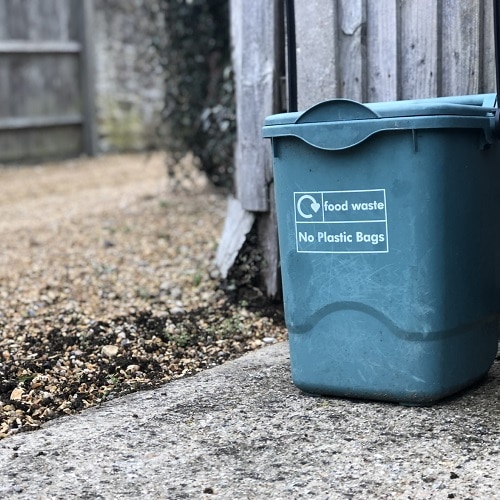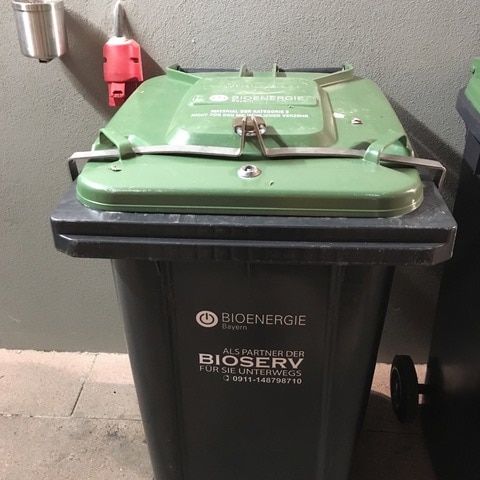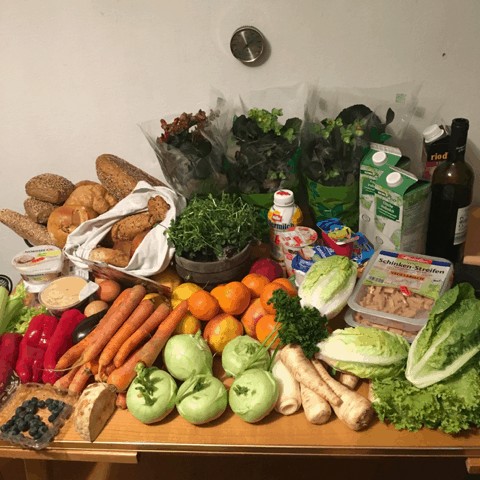It is already dark, past 10 pm, and Dora, Emil and I are riding our bikes to the backyards of local supermarkets in a little town near Munich; more precisely: to the dumpsters in these backyards. It will not be the first time that I’m going to hang upside down in a dumpster, handing bell peppers, apples, and the like to my companions: we are going dumpster diving.
In Germany, 18 million tons of the industrially produced food get thrown away yearly; 60 % of this amount is wasted by food producers and retailers according to a study by WWF from 2018. This fact makes food activists dive into dumpsters, trying to change the system of production, distribution and consumption through nonparticipation and redistribution (see Counihan/Siniscalchi 2014, p. 3;6). Although the Dumpster Divers are still participating in consumption in a non-monetary way, I want to follow Counihan/Sinischalchi here when I say that they are trying to change the system through nonparticipation. Through getting food out of dumpsters in the backyards and not buying it inside the supermarket they are at least partly disengaging with the conventional way of getting foodstuffs – they are not exchanging it against monetary value.
The term ‘food activism’ is uniting different political activist activities aimed at the food industry and towards denouncing different grievances from production until consumption. Dumpster Divers are political food activists who see the contemporary food industry and market mechanisms as contrary to their own values (see Pratt/Luetchford 2013, p. 2) and are challenging these through their actions. Dumpster Diving is a practice of recovering edible foodstuffs from supermarket dumpsters. Although I’m calling Dumpster Divers here political activists, not all people that are recovering edible foodstuffs can be considered this. During my research I also came across individuals that are motivated by economic considerations. Through the capitalist logic of overproduction food is becoming a commodity. If a commodity is not consumed, it loses its value and turns into an ex-commodity – waste that has to be discarded.
For Dumpster Divers, however, the content of dumpster bins is not valueless waste, it is wasted value. By challenging the logic of overproduction directly, they challenge the market dictate of the need to buy things (see also Barnard 2016, p. 91).
Opening the bins, Emil, Dora and I are commenting: “empty” or “there is something.” The supermarket has two empty dumpster bins and three filled ones. After a first inspection we start diving. I met Dora and Emil online over Facebook. They are two twenty somethings, sharing an apartment and about to graduate from their Master studies soon. Both of them are not Dumpster Diving out of a financial need, but out of a passion for rescuing food that would go wasted otherwise. Dora and Emil are as well both active members of the local Foodsharing chapter, an association aiming at redistributing supernumerary food from local grocery stores, bakeries and Cafés through public shelfs in community centres and the like.
And thus we have never been dumpster diving as a group before, we seem like a well-rehearsed team from the start: dividing the labour, alternating the tasks of getting items out from the top of the bins, packing them into our backpacks. Emil is helping me see with the light of his mobile phone so that I can find bell peppers and some ready-made food which are only one day over the best before date. Dora takes the items I hand out to her and packs them up. Opening the next dumpster, Emil only finds plastic rubbish, empty bottles and the like. We continue our ride to the next supermarket. At home, we unpack our loot, wash it, arrange it on the kitchen table, sharing the labour again while chatting about dumpster diving, about how we try to avoid wasting food in our individual lives and how the capitalist system is a system of having the real wealth not on displays in stores, but in the dumpsters in the backyards: A wasted wealth that is now our nutrition for the next few days. We also discuss other wasted resources of the production and distribution process of the food industry: human labour, water, seeds, plastics and other materials, electricity and the like.
We arrange our harvest on the table like a precious treasure; after each of us has taken a photograph of the table spread, I’m invited to having dinner with Dora and Emil: a dumpster diving feast. The circumstances add an extra flavour: Dora tells me about a challenge she made with herself for three months: “don’t buy any food, only live on ‘rescued food’,” as she calls it. Throughout the evening, cycling around, digging into dumpsters and washing and arranging food items, eating some of them together afterwards, we recategorize food waste into nourishment while bonding over shared practice and a common outlook on the value of food.
Although the dumpster divers are opening the dumpsters at night and in secrecy, they are bringing wasted food into the open. Not all dumpsters are freely accessible. Some markets have shutoff devices on their dumpsters, but not every market is using these devices. The pictures of ‘rescued food’ are used for awareness-raising; posted on social media and shared among family and friends.
This visualization needs to be understood as an act of protest, of disagreeing with a system that produces and then discards excess.
So far, the literature on political food activism has focused only on activist efforts that are in opposition to Dumpster Divers such as officially addressing the food industry or political institutions to reach their goals. These efforts focus on a capitalistic system of production and distribution, including the unfair working conditions for humans and living conditions for animals, the non-sustainable ways of production in agriculture and fishing, high prices for stable food at the world market and overproduction, all of which are opposing the values of the activists (Pratt/Luetchford 2013, p. 2). The Dumpster Divers, whom I was accompanying, were also critiquing these practices, but their activism is carried out in a legal grey zone since it is based on trespassing and theft, depending on the interpretation of the law. One case in Germany got very famous when two young women got caught Dumpster Diving in June 2018. They were sentenced to community service hours and paying a fee (Merkur.de, 28.02.2019). This case started a public debate whether recovering discarded food should be criminalized and about the legal situation. Efforts taken to legalize Dumpster Diving failed.
There are only a few studies on the illegal side of political food activism. In his ethnography “Freegans. Diving into the wealth of food waste in America” (2016), Barnard analyses the Freeganism movement as a protest form against neoliberal capitalism. Although Dumpster Diving and rescuing food is a huge part of the Freeganism movement, it is also tackling other areas such as shelter, clothing and transportation. Through recovering, reusing and building goods on their own, Freegans are avoiding the need of purchasing goods in exchange for monetary value. Although the approach of Barnard’s interlocutors in New York is addressing more areas of the activist’s life and is also a more radical one, the practice of Dumpster Diving and recovering food from trash bins is what our interlocutors have in common.
The activist efforts of Barnard’s Freegans and my Dumpster Divers are based on day-to-day (or, in my case, night-to-night) activities which are not aimed at directly challenging the political system, but subverting it. These types of food activists have incorporated political critique into their everyday life through ‘rescuing food’ for their private needs instead of voicing demands for institutional change on a public level. Dumpster Diving thus is a political practice that not only blurs the boundaries between the private and the public, or the personal body and the body politic, but also challenges our understanding of how we understand activism.
References:
Barnard, Alex V. 2016. Freegans. Diving into the wealth of food waste in America. Minneapolis and London. University of Minnesota Press.
Counihan, Carole & Siniscalchi, Valeria. 2014. Food Activism. Agency, Democracy and Economy. London. Bloomsbury Publishing.
Pratt, Jeff & Luetchford, Pete. 2013. Food for Change: The Politics and Values of Social Movements. London. Pluto Press.
Merkur.de. 28.02.2019. Essen aus Müllcontainer geholt: Studentinnen werden bestraft – Proteste gegen Urteil. https://www.merkur.de/lokales/fuerstenfeldbruck/fuerstenfeldbruck-ort65548/bayern-fuerstenfeldbruck-olching-essen-aus-muellcontainer-geholt-studentinnen-werden-bestraft-11612238.html, downloaded 20.06.2019.
Featured image by Patricia Valério (courtesy of Unsplash.com).





